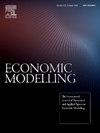两国经济中的环境政策与停滞
IF 4.2
2区 经济学
Q1 ECONOMICS
引用次数: 0
摘要
全球变暖对我们的地球构成了严重而尖锐的威胁。然而,关于允许碳排放量分配的谈判常常导致发达国家和发展中国家之间的利益冲突。发展中国家声称全球变暖是发达国家长期排放污染造成的,而发达国家则要求发展中国家做出足够的努力减少碳排放。发达国家和发展中国家普遍认为,由于相关的额外减排成本,更严格的排放限制将给其经济带来压力。通过使用具有财富偏好的两国模型,我们发现一国的排放限制对两国实际消费和污染排放的影响因其商业状况的组合而异。如果两国都实现了充分就业,一国更严格的排放限制就会减少两国的实际消费,这是意料之中的。但是,如果一个国家面临总需求停滞,而另一个国家实现了充分就业,则停滞国实施更严格的排放限制会增加两国的实际消费。本文章由计算机程序翻译,如有差异,请以英文原文为准。
Environmental policies and stagnation in a two-country economy
Global warming poses a serious and acute threat to our planet. However, negotiations over the allocation of permissible carbon emissions often lead to conflicts of interest between developed and developing countries. Developing countries claim that global warming results from long-term pollution emissions by developed countries, while developed countries demand that developing countries should make adequate efforts to reduce carbon emissions. Both developed and developing countries generally agree that stricter emission limits will strain their economies due to the associated extra abatement costs. Using a two-country model with wealth preferences, we find that the impacts of a country's emission limit on real consumption and pollution emissions in both countries vary depending on the combination of their business situations. If both countries achieve full employment, one country's stricter emission limit decreases real consumption in both, as expected. However, if one country faces aggregate demand stagnation while the other achieves full employment, a stricter emission limit imposed by the stagnant country increases real consumption in both countries.
求助全文
通过发布文献求助,成功后即可免费获取论文全文。
去求助
来源期刊

Economic Modelling
ECONOMICS-
CiteScore
8.00
自引率
10.60%
发文量
295
期刊介绍:
Economic Modelling fills a major gap in the economics literature, providing a single source of both theoretical and applied papers on economic modelling. The journal prime objective is to provide an international review of the state-of-the-art in economic modelling. Economic Modelling publishes the complete versions of many large-scale models of industrially advanced economies which have been developed for policy analysis. Examples are the Bank of England Model and the US Federal Reserve Board Model which had hitherto been unpublished. As individual models are revised and updated, the journal publishes subsequent papers dealing with these revisions, so keeping its readers as up to date as possible.
 求助内容:
求助内容: 应助结果提醒方式:
应助结果提醒方式:


